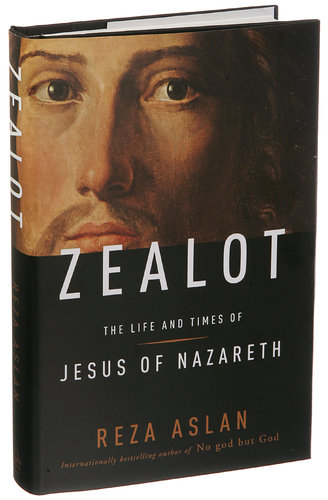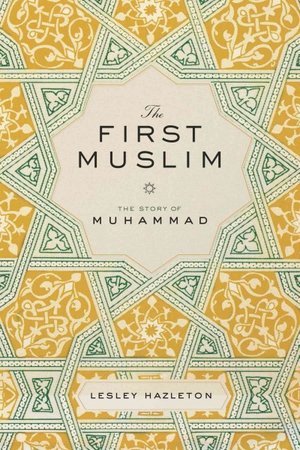What I Read on my Summer Vacation
The two books came to me from two very different sources, and while I had no intention of reading them back-to-back - that is what happened.
Reza Aslan's narrative of the life of Jesus titled Zealot, and Lesley Hazelton's The First Muslim a narrative of the life of Mohammed. Aslan's book came to my attention, as it did for many via the remarkably bizarre television interview on Fox Television. I say bizarre, because the anchor so embarrasses herself and the viewing audience by chastising Aslan for writing a book on Jesus. "How can you, a Muslim, write a book on Jesus?" she says. You can view it here. It would have been one thing if Aslan had written a book with a Muslim perspective on Jesus, i.e. making him a prophet in a long line of many prophets. That would have been more controversial. But, that is not what the book Zealot sets out to accomplish.
 In essence, what Reza Aslan has done is take the vast and growing scholarly research of the last century on the quest for the historical Jesus, and put it into a readable and mostly complete single volume. What you find here in an accessible format is what most every graduate of a theological seminary has digested in his or her New Testament class. So from that, point of view, Aslan is not all that radical. His greatest gift is to pull together the work of John Dominic Crossan, John Meier, Raymond brown and Marcus Borg, and put together a single volume that your average adult could read. He has done a good job, and the volume reads almost like a novel. It's a read, as they say.
In essence, what Reza Aslan has done is take the vast and growing scholarly research of the last century on the quest for the historical Jesus, and put it into a readable and mostly complete single volume. What you find here in an accessible format is what most every graduate of a theological seminary has digested in his or her New Testament class. So from that, point of view, Aslan is not all that radical. His greatest gift is to pull together the work of John Dominic Crossan, John Meier, Raymond brown and Marcus Borg, and put together a single volume that your average adult could read. He has done a good job, and the volume reads almost like a novel. It's a read, as they say.
However, much of what is written about in the quest for the historical Jesus has not made it's way into the consciousness of your average person in the pew. Despite my own efforts for 25 years as a parish pastor, I still lament the lack of basic understanding as to how Lutherans in particular, and most modern Christians in general read the scriptures. Therefore, if someone picks up this book and reads how only two of the four gospels contain a narrative of the Christmas stories, and Aslan makes the strong case that these were later additions by the early church - well, you might have some outraged parishioners knocking at your door demanding to know why Santa Claus has been taken out of Christmas.
I write this as a warning to those thinking they'll download Zealot onto their Kindle and dive in. You may be in for a shock. While Aslan does not dispute the healing or even the miracle stories, he lays out a case for a clear distinction between the Jesus of history (lived in Nazareth, raised as a peasant, rooted in 1st century Judaism) and the the Christ of faith (recast by Paul, narrated by John as the incarnate Word). Perhaps one could even hear Martin Luther rolling over as Aslan makes a strong case for James, the brother of Jesus, and his emphasis on Faith without Good works is Dead, as the essence of what Jesus really intended. No doubt there are flaws in Aslan's book, and others have written about them, such as Yale's Dale Martin, but the book gets it mostly right. But, be prepared, to be disturbed, confused, and knocking on your pastor's door or email inbox with questions.
What Aslan has done for Jesus, Lesley Hazelton has done for Muhammed in her equally fine book The First Muslim. I came across this book while searching through a series of TED talks. Since TED usually does not cover religious subjects, I was surprised when I found her 17 minute talk on the value of doubt and it's integral role in faith. Her talk is here.
 My reading in Islam is dramatically more limited. But I have attempted in recent years to explore and understand this religion. Most significantly for a series called "Understanding Islam" that I assembled for my congregation in Rhode Island. Admittedly the best part of that series were not to be found in my presentations, rather in the dialogue that began when a Pakistani physician, a Syrian civil engineer and an Egyptian professor showed up in response to a tiny newspaper article announcing the event. The four of us sat for three Wednesday evenings and discussed Islam and Christianity.
My reading in Islam is dramatically more limited. But I have attempted in recent years to explore and understand this religion. Most significantly for a series called "Understanding Islam" that I assembled for my congregation in Rhode Island. Admittedly the best part of that series were not to be found in my presentations, rather in the dialogue that began when a Pakistani physician, a Syrian civil engineer and an Egyptian professor showed up in response to a tiny newspaper article announcing the event. The four of us sat for three Wednesday evenings and discussed Islam and Christianity.
Lesley Hazelton has done for readers interested in the origins of Islam, what Reza Aslan has done for the origins of Christianity. The First Muslim narrates the story of Muhammad from orphaned boy raised by bedouin shepherds through receiver of divine revelation to leader of an emerging nation. She carefully separates out the historical and biographical from the later additions of tradition, in much the same way as Aslan has done for Jesus. There are some fascinating parallels in these two books, for instance one can see the strong emphasis in both Jesus and Muhammad for correcting the dramatic gulf between the rich and the poor. Both men saw this from early life experiences where those in power had vast amounts of wealth compared to those in abject poverty.
Hazelton is a fine writer, and makes this the most accessible of all the books I have read on Islam. She is not without her critics who have reviewed the book less favorably. But, again, I would argue her purpose is to be as true to the research as possible, while maintaining an eye on composing an accessible narrative.
-
Why were these two books brought to my attention at the same time? No, I am not suggesting that I intuited some revelation, divine or otherwise. I am seeing a connection and a problem, as well as an opportunity.
The connection in both of these books is an extension of the Bultmanian demythologizing project. Rudolf Bultman was the German biblical scholar who stripped all the myth, fantasy and fiction out of scripture. The effort was to boil it down to its core essence. Both Aslan and Hazelton have taken the scholarship of their respective fields and written a book that is fairly easy for a modern educated adult to digest. We are left with a good story of some amazing men who quite possibly had some kind of divine connection/revelatory encounter, and endeavored to right the wrongs of the social injustices of their times. If that is the case, then why bother following one or the other for that matter. (Similar books have been written about the Buddha and other religious figures) This problem is why we have seen a dramatic increase in fundamentalism in all religions around the world. "Just get back to the fundamentals of our faith. Don't engage in scholarship. Read the words as they are written before us and apply them" These are among the statements and attitudes. One can understand why this response has such an appeal.
But, ignoring the scholarship, not using our own (I believe God given intellect) to sort through the matter, would be a greater injustice. Among all the themes of this blog, I'm trying to encourage a way through this 'stuff' - a public wrestling with the questions, doubts and wonderings of a modern or post-modern guy. What does it mean for me as a Christian to embrace scriptures that are the inspired word of God (note I did not say inerrant word of God)? What does it mean that I live in an age of science where the depths of atoms and the expanse of the universe are vastly more significant than when Isaiah was stomping around ancient Israel? What does it mean to be a follower of a first century peasant who was so outraged by the economic inequalities of his time that he was willing to openly challenge the leadership of his religion, and I live in a time of equal, if not greater inequalities? What does the newfound 'science' of psychology teach us about the power of myth, meaning and dreams, both now and in the time of Joseph?
If you want quick short, matter of fact answers, you can check last night's scoreboard to see how the Red Sox faired. While I'll look for that information on ESPN.com, this is the place to explore, in the words of the unknown author of the New Testament book of Hebrews, 'faith is the assurance of things hoped for, the assurance of things not seen.'